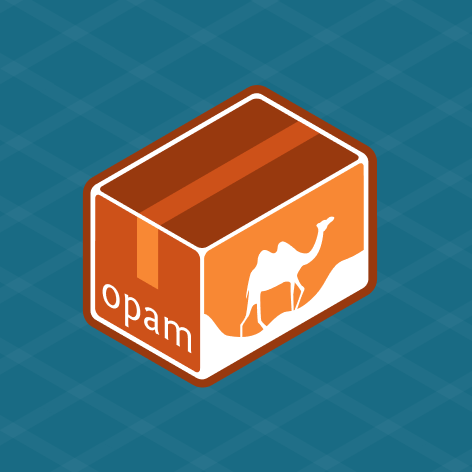The Opam 2.0 cheatsheet, with a new theme!
Earlier, we dusted-off our Language and Stdlib cheatsheets, for teachers and students. With more time, we managed to design an Opam 2.0 cheat-sheet we are proud of. It is organized into two pages:
- The everyday average Opam use:
- Installation, Configuration, Switches, Allowed URL formats, Packages, Exploring, Package pinning, Working with local pins, Sharing a dev setup, Configuring remotes.
- Peculiar advanced use cases (opam-managed project, publishing, repository maintenance, etc.):
- Package definition files, Some optional fields, Expressions, External dependencies, Publishing, Repository administration.
Moreover, with the help of listings, we tried the use of colors for better readability. And we left some blank space for your own peculiar commands. Two versions are available (PDF):
- The Opam cheatsheet in black & white
- The Opam cheatsheet in colour.
In any case do not hesitate to send us your suggestions on github:
- Louis and Raja, the lead Opam developers, designed this cheatsheet so as to shed light on some important features (some I even discovered even though I speak daily with them!). If a command you find useful is not mentioned, let us know and we’ll add it. Feel free to ask for clarification and/or expansion of the manual!
Happy hacking!
Note: If you come to one of our training sessions, you’ll get a free cheatsheet! Isn’t that a bargain?
About OCamlPro:
OCamlPro is a R&D lab founded in 2011, with the mission to help industrial users benefit from experts with a state-of-the-art knowledge of programming languages theory and practice.
- We provide audit, support, custom developer tools and training for both the most modern languages, such as Rust, Wasm and OCaml, and for legacy languages, such as COBOL or even home-made domain-specific languages;
- We design, create and implement software with great added-value for our clients. High complexity is not a problem for our PhD-level experts. For example, we helped the French Income Tax Administration re-adapt and improve their internally kept M language, we designed a DSL to model and express revenue streams in the Cinema Industry, codename Niagara, and we also developed the prototype of the Tezos proof-of-stake blockchain from 2014 to 2018.
- We have a long history of creating open-source projects, such as the Opam package manager, the LearnOCaml web platform, and contributing to other ones, such as the Flambda optimizing compiler, or the GnuCOBOL compiler.
- We are also experts of Formal Methods, developing tools such as our SMT Solver Alt-Ergo (check our Alt-Ergo Users' Club) and using them to prove safety or security properties of programs.
Please reach out, we'll be delighted to discuss your challenges: contact@ocamlpro.com or book a quick discussion.
Most Recent Articles
2025
2024
- opam 2.3.0 release!
- Optimisation de Geneweb, 1er logiciel français de Généalogie depuis près de 30 ans
- Alt-Ergo 2.6 is Out!
- Flambda2 Ep. 3: Speculative Inlining
- opam 2.2.0 release!
- Flambda2 Ep. 2: Loopifying Tail-Recursive Functions
- Fixing and Optimizing the GnuCOBOL Preprocessor
- OCaml Backtraces on Uncaught Exceptions
- Opam 102: Pinning Packages
- Flambda2 Ep. 1: Foundational Design Decisions
- Behind the Scenes of the OCaml Optimising Compiler Flambda2: Introduction and Roadmap
- Lean 4: When Sound Programs become a Choice
- Opam 101: The First Steps
2023
